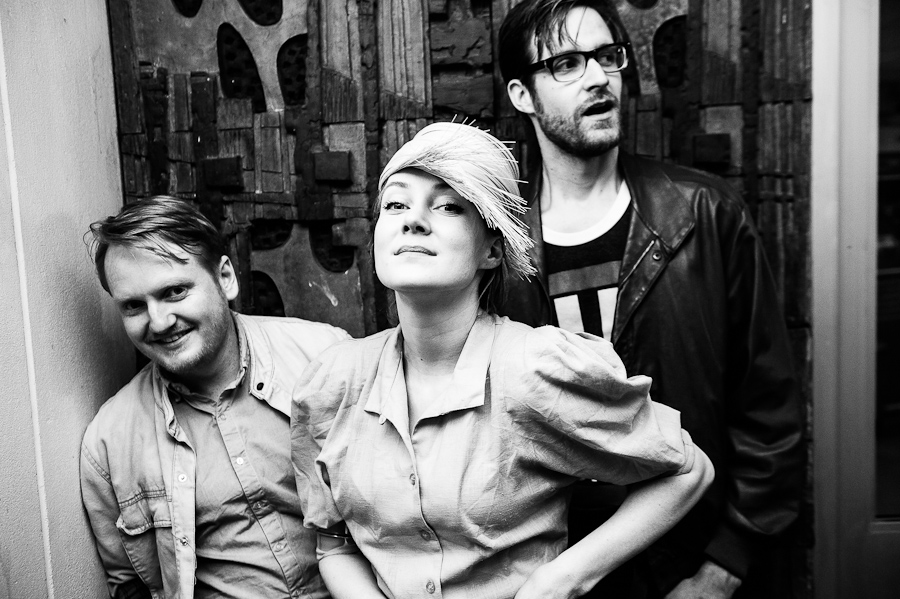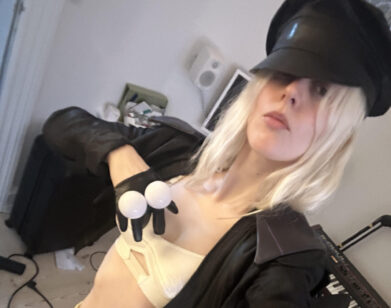Discovery: Philco Fiction

It’s funny to think that only a few years ago, Philco Fiction’s early 1990s leanings would have been discussed in a “guilty pleasures” context. But Philco Fiction (which features drummer Andreas Knudsrød, keyboardist Bjarne Gustaven, and vocalist Turid Solberg) is a proud product of their generation—unashamed to include backup dancers in their live shows or name-check Thriller in conversation.
Far from aping influences, the trio uses their reference points as a springboard into an altogether stranger, and more certainly fantastic, place. Their debut full-length, Take it Personal, takes cues from late 1980s and early 1990s dance-pop royalty, while maintaining a haunted electro ambience that places it alongside works from contemporaries such as Fever Ray and Lykke Li. The result? “Our music is about making people dance and cry at the same time,” explains Knudsrød.
We caught up with the trio last month at the Øya Festival in Oslo, Norway. The trio filled us in on how they discovered their debut album’s unexpected guest star, the era that started it all, and how unusual musical traits seem to run in the family. They also provided us with the debut of their track “Help!,” which you can stream below.

HOMETOWN: Oslo, Norway
ON CHOOSING THEIR HISTORIC MONIKER: Andreas Knudsrød: With Philco first of all, that’s an old radio manufacturer from Philadelphia. Philco Radio Company. They made really nice radios in the 1930s. Fiction is fiction.
Solberg: It is what it is.
Turin Knudsrød: The band name came from Google.
Solberg: It was more visceral than that. We fell in love with this radio image. Especially radios from the ’30s.
Bjarne Gustaven: We get inspired by all kinds of fiction. Other people’s music and films and books. So we tried to concentrate everything in one word. We are three different people with different influences and references. Listening to us, maybe it can be a bit like tuning the radio.
INFLUENTIAL ERA: Gustaven: We grew up in the 1990s.
Knudsrød: I don’t know what you’re talking about! [laughs]
Gustaven: Yeah. We grew up, and we were just kids playing around. We grew into being teenagers in the 1990s. It’s a very important time of our lives.
Solberg: I think there’s a lot of good music from that period. It was good in the 1990s and it still is good.
BOWING TO THE KING OF POP Solberg: Michael Jackson! It’s quite obvious he’s an influence.
Gustaven: Some of our backup dancers are very Michael Jackson-ish.
Solberg: The beginning of hip-hop, as well, it was very influential.
Knudsrød: Michael Jackson, Prince, Janet Jackson. All that kind of stuff. There’s a lot of others. Tons. Some of them obvious and some of them not so obvious.
KEEPING IT IN THE FAMILY: Solberg: I started to sing in a girls’ choir. But I didn’t really like it that much. My sister started this music group. She was saying to me that I couldn’t sing, that I was a terrible singer. I think I started just to prove her wrong. It started also with dance. Dancing and singing at the same time.
Gustaven: I have a grandfather who played the musical saw. That’s about it.
Knudsrød: I have a great-grandmother who played piano at the silent movies in the 1920s. She was crazy. I have that from her, both of them, the music and the crazy.
Solberg: My father is very good at whistling. Very good.
ON TAKE IT PERSONAL‘S GUEST MUSICIAN: Gustaven: There’s a saw on our album. That’s a guy we met when we were in New York. This guy was playing a saw on the subway. It sounded really great. So we got his card and we called him and got him to do a session because we had some simple recording equipment. He did two tracks for us. His name was Moses, and he was maybe 75 years old.
Knudsrød: He was very nervous in the beginning, I think.
Gustaven: He put up his tape deck, and he had some backing tracks. He played “Imagine” and “Amazing Grace.”
Knudsrød: We had to stop him and say, “Okay, Moses, we need you to play something else.”
Solberg: He was like, “Oh, can you promote this to your radio stations back home? Your gospel radio stations?” We were like, “What’s our gospel radio stations? I’m not quite sure if we have one!”
OPENING UP THE CREATIVE PROCESS: Solberg: I think it happens by accident. We didn’t plan to record something [in New York]. I think our process is kind of closed. We need to, because we have so many different ideas.
Knudsrød: It’s also this thing, like when you see an old man sitting in the subway playing a saw. You just think, “Oh it would be cool to have him on the next record!” You’re like: “Let’s call him tomorrow!” and then the day after you didn’t do it. This time we’re like, “Let’s do it!” just to do something, finally.
DEFINING “SCANDINAVIAN MELANCHOLY”: Solberg: That’s a tricky thing, I think.
Knudsrød: We’ve been discussing that. Our music is about making people dance and cry at the same time.
Solberg: We tell stories. In every story there’s a lot of sides. A love story can be very sad and very happy at the same time. That’s something; I try to catch this two-sided thing. I try to hold it there, where you’re unsure.
HOPELESS ROMANTICS? Gustaven: Not necessarily. But musically it tends to get that way, where you take an everyday situation and magnify it. Small things get really big.
Solberg: It’s important for people to be romantic at some point. Maybe not really personal, but on behalf of others or through others or other art.
IT’S IN THE CARDS: Knudsrød: Coincidences have lead to other great things. We were in the Netherlands, we were playing a really crappy place. It was the first time we were in the Netherlands, and we were thinking, “Why are we here?” But there was this guy at the concert who really loved our music and arranged another tour for us, which was really great. So you never know.
Solberg: I think it’s more that you never know.
Gustaven: The only thing we can do is our best, we guess.
Knudsrød: And then things happen.
FILL IN THE BLANK “WITHOUT MUSIC I WOULD _____”: Solberg: For me, I set out to make music, or art. I was educated as a designer. I’m doing a bit of both.
Gustaven: I think I always wanted to do music. I don’t have a Plan B. But it doesn’t feel like Plan A either. I can’t explain it. I’m just doing it, and things happen and you wake up another day and you’re still doing music.
Knudsrød: I kind of have that same feeling. There’s nothing else to do now. It’s too late! You make some choices over ten years.
Solberg: What part of the process do you like most?
Gustaven: He likes the drumming!
Solberg: He’s in love with the drumsticks. They’re so beautiful!
Knudsrød: For me, it would be harder to not work with music than work with music now. I would really have to make a choice to do something else. Sometimes it feels good, sometimes it doesn’t. Some days I feel like I should have done something else. But if I do something else, I’d have to stop.
Solberg: Now we can’t stop. For me, I’m very curious as to what we’ll make next.
Gustaven: Usually it has to do with cash. If the cash flow is low, you want to stop. But then something happens and you say, “Hey!” It’s all strikes and gutters.
Solberg: And rainbows!
FOR MORE ON PHILCO FICTION, VISIT THEIR FACEBOOK PAGE.






